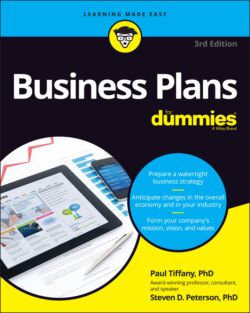Читать книгу Business Plans For Dummies - Paul Tiffany - Страница 32
Bringing Your Ideas into Focus
ОглавлениеThe concept of a plan originated with the early builders of, well, buildings, not businesses. If you’ve had a house built or have remodeled one recently, you know that this kind of plan is still around (and is expensive). Over the centuries, however, the meaning of the word plan has expanded to include time as well as space. A plan in the modern sense also refers to a view of the future, as seen from the present. You make plans for a business trip next month or a holiday next summer (holiday, you ask; what’s that? Is it an Italian word?).
A business plan is a particular view of your company both today and into the future, planning for the following things:
What your industry will look like
What markets you want to compete in
What competition you’ll be up against
What products and services you want to offer
What value you can provide customers
What long-term advantages you think you’ll have
How big and profitable your company can become
To create this detailed view of the future, you have to make a whole bunch of predictions about what’s going to happen down the road. If your company manufactures crystal balls, of course, you’re in luck. If not, you have to find other ways to make some basic business assumptions about the future.
In the end, your business plan is only as good as all the assumptions you put into it. To make sure that your assumptions make sense, much of your planning should involve trying to understand your surroundings today — what goes on right now in your industry and marketplace. By making these assumptions, you can better predict the future of your business. Will your predictions actually come true? Only time can tell. Fortunately, the planning process better prepares you for what lies ahead.
